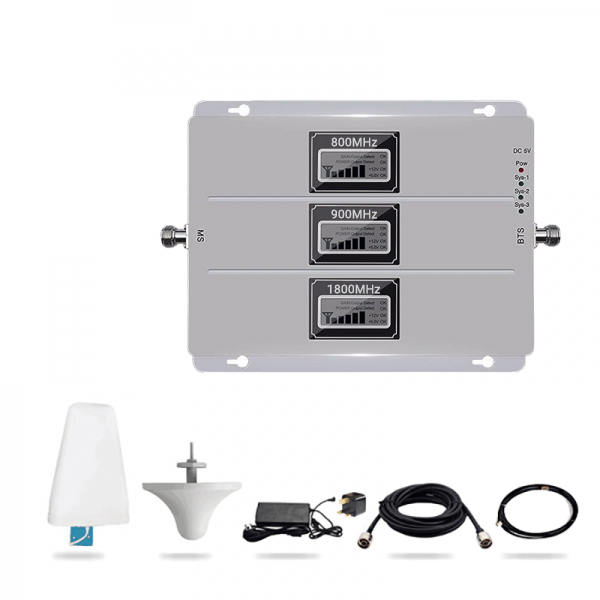GSM Mobile Signal Booster

Everything You Need to Know About GSM Repeaters
GSM repeaters, also known as GSM boosters, have become essential devices for improving mobile signal strength, especially in areas where reception is weak. Whether you're in a rural area, a basement office, or any location with poor coverage, a GSM repeater can significantly enhance the quality of your calls and data transmission. In this article, we'll explore the importance of GSM repeaters, how they work, and how to choose the best one for your needs.
What is a GSM Repeater?
A GSM repeater is a device designed to boost mobile phone signals, ensuring better reception and stronger connectivity. It works by amplifying the weak signal outside a building and broadcasting it inside, providing improved coverage for calls and mobile internet. This can be a game-changer in locations where mobile signals are typically unreliable.
GSM repeaters consist of three main components:
- An outdoor antenna: This captures the weak signal from the nearest cell tower.
- An amplifier: This increases the strength of the captured signal.
- An indoor antenna: This broadcasts the boosted signal to areas inside the building.
How Does a GSM Repeater Work?
The GSM repeater's outdoor antenna receives weak signals from nearby cell towers and sends them to the amplifier. The amplifier then enhances the signal and transmits it to the indoor antenna. This indoor antenna distributes the stronger signal throughout the building, allowing mobile phones to have better reception.
The whole process works in reverse for outgoing signals, improving both the quality of calls and the speed of mobile internet. This seamless process ensures that users experience fewer dropped calls, faster download speeds, and a more reliable connection overall.
Benefits of Using a GSM Repeater
There are numerous advantages to installing a GSM Mobile Signal Booster, particularly in areas with poor mobile reception. Here are some key benefits:
- Improved Call Quality: Say goodbye to dropped calls and muffled conversations. A GSM repeater enhances call clarity, allowing you to communicate with ease.
- Faster Data Speeds: In addition to improving voice quality, GSM repeaters also boost 3G, 4G, and even 5G data speeds, making it easier to browse the internet, stream videos, and download files.
- Wider Coverage: GSM repeaters can cover large areas, making them ideal for homes, offices, and commercial spaces.
- Energy Efficiency: When your phone receives a strong signal, it uses less battery power to maintain the connection, prolonging the life of your device's battery.

Where Can You Use a GSM Repeater?
GSM repeaters are versatile devices and can be used in various settings, including:
- Homes: Whether you're living in a rural area or in a house with thick walls, a GSM repeater can ensure you always have a strong signal.
- Offices: In many urban environments, office buildings can block or weaken mobile signals. A repeater can help keep your business connected.
- Cars: For those who spend a lot of time on the road, GSM repeaters can be installed in vehicles to ensure uninterrupted mobile service during long drives.
How to Choose the Right GSM Repeater
When selecting a GSM repeater, it's essential to consider several factors to ensure it meets your specific needs.
-
Signal Strength Outside: The strength of the signal outside your building will determine the type of repeater you need. A stronger outdoor signal will require a less powerful repeater, while weak signals may need a high-gain booster.
-
Coverage Area: Determine how much area you want to cover with the improved signal. Some GSM repeaters can cover small apartments, while others are designed to cover large buildings or multiple floors.
-
Frequency Band: Ensure that the GSM repeater you choose supports the frequency band used by your mobile carrier. Some models are compatible with multiple frequency bands, making them suitable for various network providers.
-
Indoor Antenna Type: Depending on your space, you may need either an omnidirectional antenna (which distributes the signal in all directions) or a directional antenna (which focuses the signal in a specific direction).
-
Ease of Installation: Some GSM repeaters are easier to install than others. Consider whether you want a DIY-friendly device or one that requires professional installation.
Conclusion
GSM repeaters are an invaluable solution for anyone experiencing poor mobile reception. They enhance call quality, improve data speeds, and ensure you stay connected no matter where you are. Whether for home, office, or vehicle use, these devices can make a significant difference in your communication experience.
When selecting a GSM repeater, it's essential to consider factors such as outdoor signal strength, coverage area, and compatibility with your mobile network. By choosing the right GSM repeater, you can enjoy uninterrupted mobile service, clearer calls, and faster internet speeds, all from the comfort of your home or office.
- Art
- Causes
- Crafts
- Dance
- Drinks
- Film
- Fitness
- Food
- الألعاب
- Gardening
- Health
- الرئيسية
- Literature
- Music
- Networking
- أخرى
- Party
- Religion
- Shopping
- Sports
- Theater
- Wellness
- IT, Cloud, Software and Technology


